Want to know how to become a music producer? A music producer plays a big role in crafting the tunes people enjoy, mixing technical know-how with creative spark to turn a simple idea into a finished hit. This job fits perfectly for anyone who loves both technology and music. Many top producers started by experimenting at home, using software or gear that anyone can get. Fun fact: some famous hits were made with just a laptop and a couple of plug-ins. Learning the ropes opens a whole new world of sound and cool opportunities. Keep reading to discover the secrets behind making music that moves the world.
Music producers navigate the complexities of music production, audio engineering, and artist collaboration, ensuring each track meets industry standards while capturing the artist’s intent.
In this article, we’ll delve into: What responsibilities do music producers have in the recording process? How do their technical expertise and creative decisions impact the outcome of a song? And what steps should one take to pursue a career in music production?
With the music industry’s rapid evolution, understanding the multifaceted role of music producers is crucial. Let’s dive into how you can start to create music now and become a successful music producer.
How To Become a Music Producer
Let’s now cover the 7 steps for how you can become a music producer.
1. Understanding the Role of a Music Producer
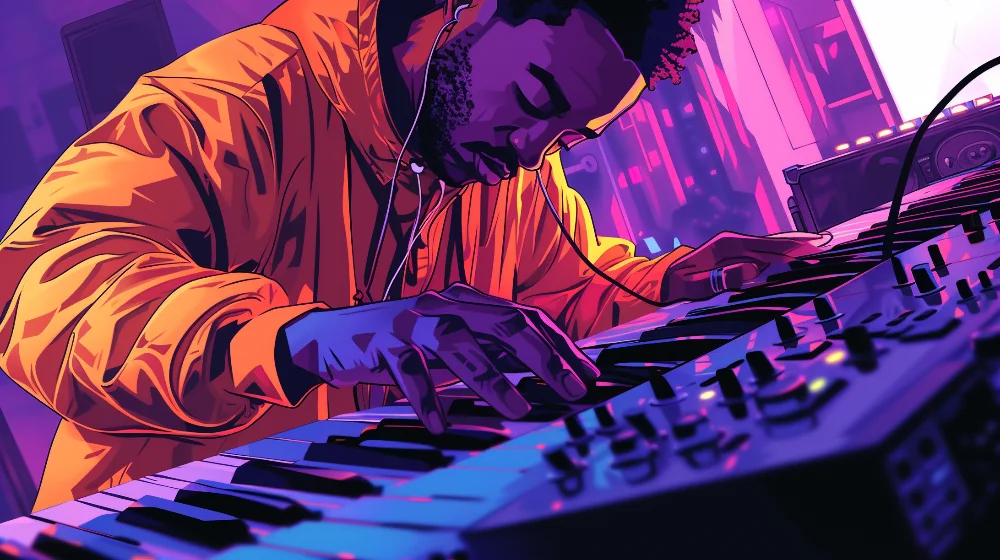
The role of a music producer is multifaceted, blending music production, audio engineering, and music theory to shape the sound of a recording.
A music producer’s responsibilities extend beyond mere song creation; they are pivotal in orchestrating the recording process, selecting the right music equipment, and ensuring the final product aligns with the artist’s vision and the music industry standards. Producers come in various types, each with a unique set of skills and focus areas.
For instance, electronic music producers primarily work with digital music production software to create beats and sounds, while executive producers oversee the project’s financial and logistical aspects, ensuring the production stays within budget. Mixing engineers and mastering engineers, on the other hand, specialize in refining the sound quality of the music tracks.
Famous music producers have significantly impacted the music production industry, demonstrating the profound influence a skilled producer can have on an artist’s career and the music’s success.
These case studies highlight how producers like George Martin, Rick Rubin, and Max Martin have shaped the sound of iconic albums and artists, underscoring the importance of a producer’s vision and expertise in the recording process.
Tthe role of a music producer is critical in the music production process, requiring a deep understanding of music theory, audio engineering, and interpersonal skills.
Whether working as an independent music producer or within a music production institution, producers must navigate the complexities of music production techniques, music industry events, and artist relationships to create compelling and successful music.
Their work not only involves technical and creative aspects but also demands passion for music, a trained ear, and the ability to manage the music production budget effectively.
2. Essential Skills for a Music Producer
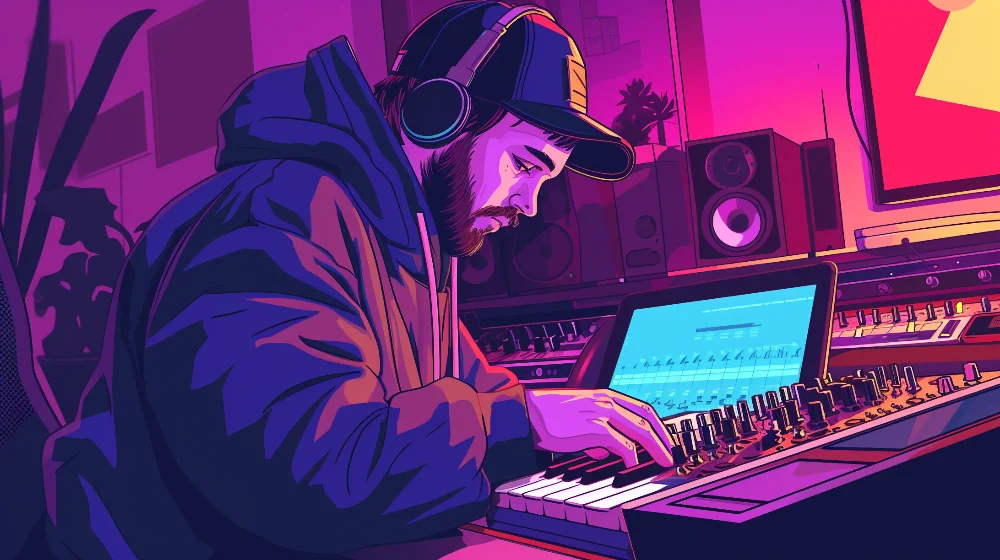
Successful producers have a diverse set of skills. These skills need to be learned to truly be a professional music producer.
Every skill listed below isn’t 100% necessary to start producing music on a professional level, but each skill will go a long way in helping you develop into someone who truly knows how to produce music.
This section delves into the key competencies that every aspiring music producer should aim to develop.
- Playing an Instrument: A comprehensive understanding of music is crucial for a music producer. Being well-versed in at least one instrument can provide a significant advantage. This also helps you stay more creative in the production process as you won’t have to book recording sessions with other instrumentalists. The piano and guitar are some of the best instruments to learn for music production.
- Sound Engineering: This involves understanding the technical basics of recording music. It’s beneficial to gain hands-on experience by recording local bands and experimenting with audio gear.
- Music Theory & Composition: Also known as songwriting, this skill is essential for a good music producer. It involves understanding the details of song composition and structure.
- Managing People: A music producer often works with a diverse team to put together an album. Therefore, having strong people management skills is critical for ensuring everyone works well together and the project progresses smoothly.
- Communication: Music producers often need to translate technical aspects of music production for artists who may not be knowledgeable about these details. Effective communication skills are therefore vital.
Adaptability: The role of a music producer can be complex and multi-layered, requiring the ability to switch between various roles during any given project.
| Skill | Description |
|---|---|
| Playing an Instrument | Understanding music comprehensively and being proficient in at least one instrument |
| Sound Engineering | Understanding the technical basics of recording music |
| Music Theory & Composition | Understanding song composition and structure[ |
| Managing People | Ensuring smooth collaboration within a diverse team |
| Communication | Translating technical aspects of music production for artists |
| Adaptability | Switching between various roles during a project |
Ever thought about creating music that sounds professional without spending a fortune?
SoundShockAudio has a treasure trove of free music production tools that are a game-changer for beginners on a budget.
3. Getting Comfortable with a Digital Audio Workstation (DAW)
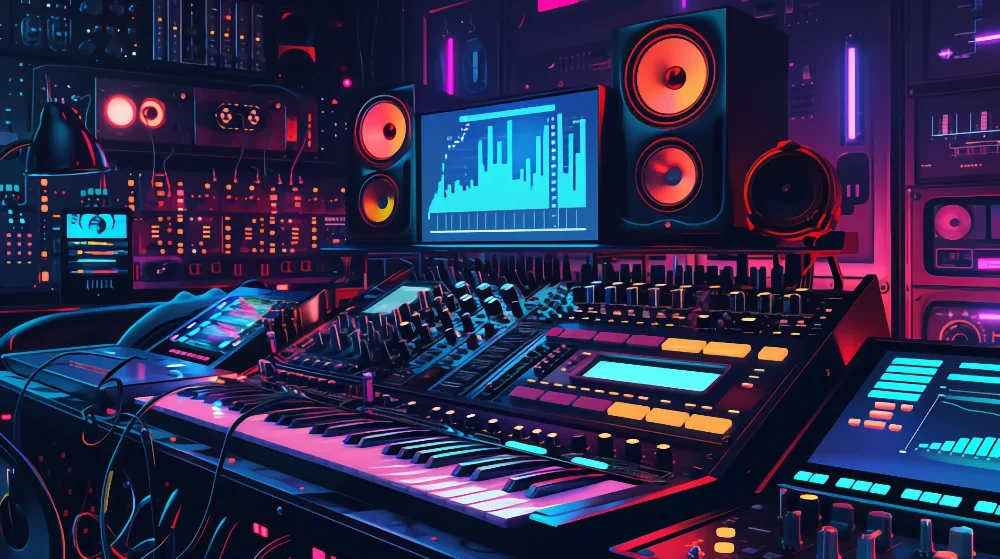
A Digital Audio Workstation (DAW) is the cornerstone of modern music production. It’s a software platform that allows music producers to record, edit, arrange, mix, and master music tracks. Successful music producers must become well-versed in using a DAW, which acts as a virtual studio brimming with tools and features essential for creating music.
Popular DAWs include Pro Tools, known for its industry-standard status in professional studios; Ableton Live, favored by electronic music producers for its intuitive live performance features; Logic Pro, which offers a comprehensive suite of tools for Mac users; and FL Studio, which is popular for its pattern-based sequencing.
Each DAW has its unique workflow and capabilities, and choosing the right one is a personal decision that should be based on your music style, workflow preferences, and the specific features you need for your production work.
To select the best DAW for your needs, it’s advisable to try out demos and consider factors such as the user interface, available tools, compatibility with third-party plugins, and the overall workflow.
Many DAWs offer free or feature-limited versions, which can be a great way to get started without a significant investment. As you grow more comfortable with your chosen DAW, you’ll find that it becomes an extension of your creative process, enabling you to bring your musical ideas to life with precision and flair.
Looking for the best FREE DAWs to start out with? We’ve got your covered. Check out all the free DAWs available on SoundShockAudio.
4. Education and Training for Music Producers
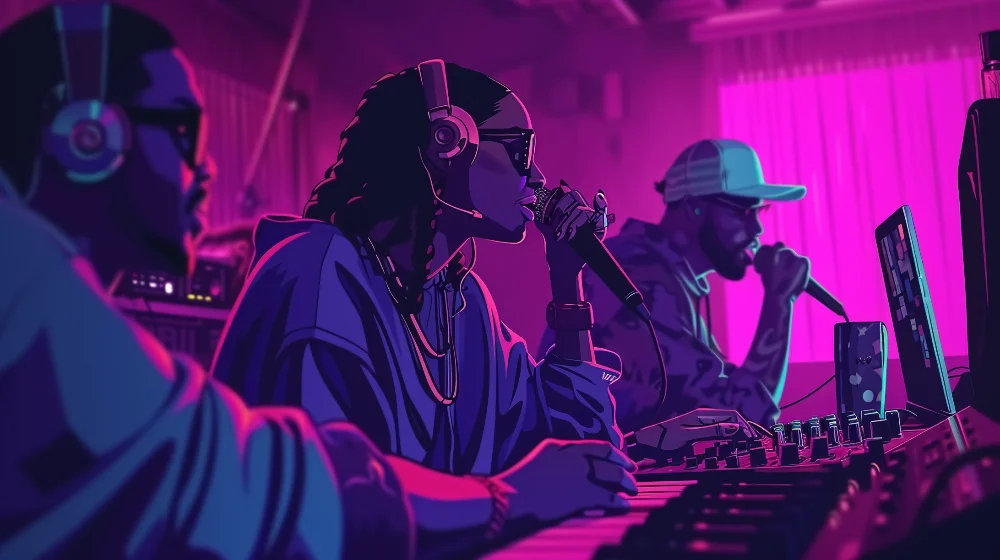
Learning how to become a music producer often begins with a solid foundation in music theory and composition. Formal education, such as a bachelor’s degree in fine arts, music production, or sound engineering, can provide this foundational knowledge.
These programs are offered by various music production institutions and music schools like the SAE Institute and Abbey Road Institute. They cover a range of topics from the technical aspects of music production to the creative process of music writing and song creation.
In addition to traditional degree programs, there are numerous music production courses available online through platforms like MasterClass, Point Blank Music School, or ProductionMusicLive.com. These courses can range from beginner to advanced levels and often provide a more flexible learning schedule. They can be particularly beneficial for those who prefer personal tutoring or need to balance their education with other commitments.
Hands-on experience is equally important in the music production industry. Aspiring producers should seek opportunities to apply their knowledge in real-world settings, whether through internships, collaborating with local artists, or creating their own music. This practical experience is invaluable and can often lead to making important music producer connections and building a music producer network.
| Education/Training Type | Description |
|---|---|
| Bachelor’s Degree | Formal education in music theory, composition, and sound engineering |
| Online Courses | Flexible learning options for various aspects of music production |
| Hands-on Experience | Practical application of skills through internships and collaborations |
Ultimately, the combination of formal education, continuous learning through online resources, and practical experience form a comprehensive approach to training for a successful music production career. Aspiring producers need to remain open to learning and adapting as the music industry evolves with new technologies and trends.
5. Setting Up Your Music Production Studio
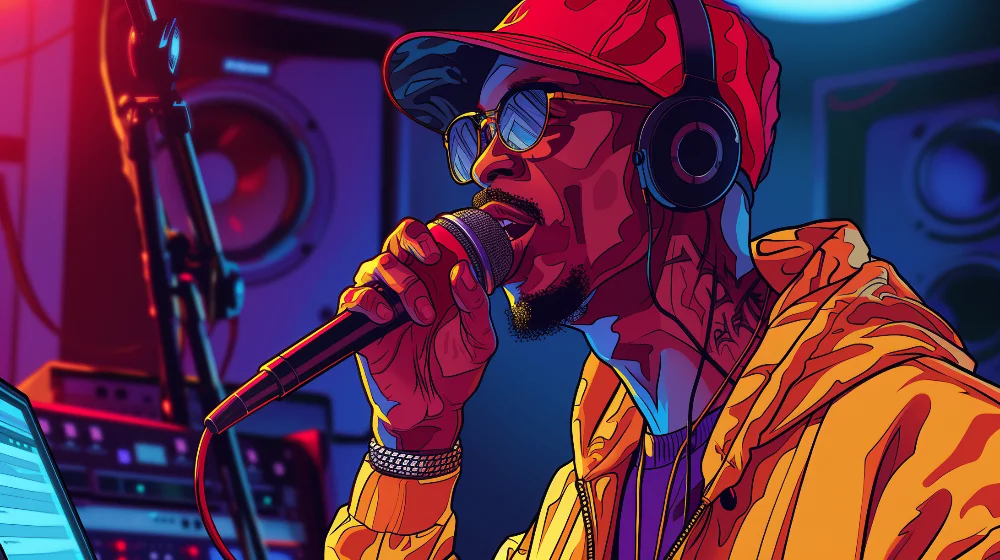
Creating a personal music production studio is a pivotal step in a music producer’s career. You don’t need to be an expert music producer to set up a music studio. This space is where the magic happens, from music writing to recording, mixing, and mastering tracks.
Essential music equipment for a home studio includes a reliable computer, a chosen Digital Audio Workstation (DAW), an audio interface, studio monitors, headphones, and microphones. Each piece of equipment plays a crucial role in the quality of the music produced.
- A computer is the central hub of a home studio, running the DAW and other music production software.
- The DAW is the software environment where much of the production work takes place.
- An audio interface converts microphone and instrument signals into a format that the computer can process.
- Studio monitors and headphones are necessary for accurate monitoring of frequencies, notes, chords, and overall sound quality.
- Microphones capture the nuances of vocals and instruments.
Setting up the studio for optimal sound quality involves considering room acoustics, where strategic placement of equipment and acoustic treatment can significantly improve the listening environment. Investing in quality equipment can make a substantial difference in the production quality, but it’s also important to work within a music producer’s budget.
| Studio Component | Purpose |
|---|---|
| Computer | Runs DAW and music production software |
| DAW | Software for recording, editing, and mixing music |
| Audio Interface | Converts analog signals to digital |
| Studio Monitors | For accurate sound monitoring |
| Headphones | For detailed listening and mixing |
| Microphones | Captures vocals and instruments |
A well-equipped home studio not only enables music producers to work efficiently but also provides the freedom to experiment with different music production techniques and sounds. As producers advance in their careers, they may continue to upgrade their studios with additional gear like hardware synths, effects processors, and specialized recording equipment.
Here are some of our top budget picks for music producers just starting:
Perfect for New Producers, Expressive Pads, and Keys
Feature-rich and compact MIDI controller with excellent pads and keys for expressive creation.
Ideal for beginners needing quality sound in podcasting, vocals, and varied audio sources.
Affordable, comfortable gaming chair with ergonomic support: ideal for music producers, gamers and home office workers seeking value.
For a more detailed review of each of these picks and our other top music production gear, check out the following round up reviews.
- Best MIDI Keyboards and Controllers
- Best Studio Microphones for Recording
- Best Laptops for Music Production
- Best Desks for Music Production
- Best External Hard Drives for Music Production
- Best Music Studio Chairs
6. Building a Career in Music Production
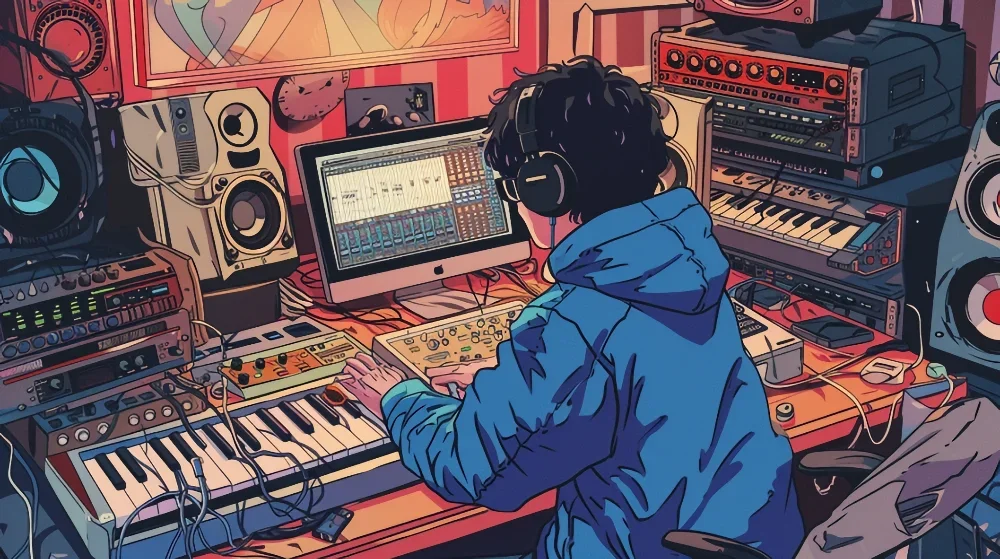
Building a successful career as a music producer involves several key steps that go beyond just honing your craft. It starts with creating a strong portfolio that showcases your best work, which is essential for attracting music producer clients and artists.
Networking is another crucial aspect, as making the right music producer connections can lead to valuable opportunities within the music industry. This can involve attending music industry events, joining organizations like the Audio Engineering Society (A.E.S.) or The Recording Academy (GRAMMYs), and engaging with other music producers, studio engineers, label executives, artists, and musicians.
Working with artists, whether established or up-and-coming, is a practical way to gain music producer experience and can often lead to more music producer jobs. It’s also important to consider the various career paths available, such as becoming an independent music producer, working for a record label, or specializing in a particular aspect of production like mixing or mastering (audio).
Income potential for music producers can vary widely and is influenced by factors such as the number of projects, the producer’s reputation, and the specific terms of their contracts with artists or labels. It’s essential to understand these factors and manage your music production budget effectively.
- Create a Portfolio: Showcase your best work to attract clients and artists.
- Network: Make connections within the music industry.
- Work with Artists: Gain experience and build your reputation.
- Consider Career Paths: Explore different roles within music production.
- Understand Income Potential: Be aware of factors that influence earnings.
A career in music production is not just about technical skills; it also requires interpersonal skills, a passion for music, and a commitment to continuous learning and adaptation. With dedication and hard work, music producers can navigate the music production industry and achieve success.
7. Challenges and Opportunities in the Music Production Industry
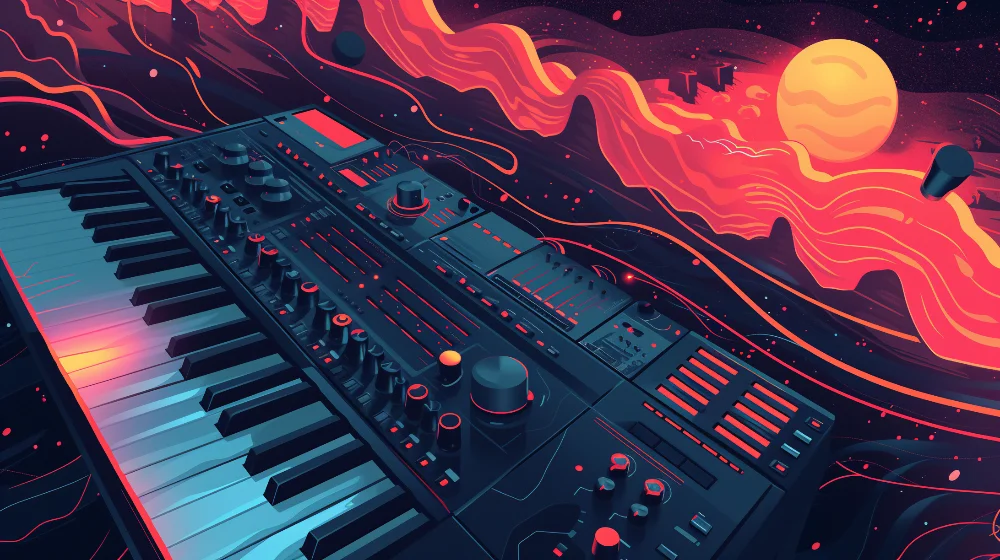
The music production industry is a dynamic and competitive field, presenting both challenges and opportunities for music producers. One of the common challenges is the intense competition, as many talented individuals are vying for a limited number of music producer jobs.
Changes in technology, such as the rise of digital audio workstations (DAW) and home studios, have lowered the barriers to entry, increasing the number of aspiring producers. Additionally, income instability can be a concern, as work often comes in the form of short-term projects or gigs.
Despite these challenges, there are numerous opportunities in the industry. The same technological advancements that have increased competition have also opened up new possibilities for independent music producers. Online platforms have made it easier than ever to distribute music and reach a global audience. Furthermore, the rise of independent music production allows producers to work outside the traditional record label system, giving them more creative control and the potential for higher earnings.
- Challenges
- Competition: Many talented individuals are competing for a limited number of opportunities.
- Technology Changes: Rapid advancements can require continuous learning and adaptation.
- Income Instability: Work often comes in the form of short-term projects or gigs.
- Opportunities
- New Technology: Advances in technology have opened up new possibilities for music production.
- Online Platforms: It’s easier than ever to distribute music and reach a global audience.
- Independent Music Production: Producers can work outside the traditional record label system, giving them more creative control and potential for higher earnings.
In this ever-evolving industry, the key to success lies in adaptability and resilience. Music producers must stay updated with the latest music production techniques, technologies, and trends, and be ready to seize new opportunities as they arise.
The Largest FREE Music Production Tools Library on the Web
So what is the fastest way to start producing professional-sounding music if you are on a budget?
SoundShockAudio has the largest collection of free music production resources on the internet to help you produce your best music on a budget. You’ll find everything from VST plugins, sample packs, DAW templates, and much more in the library.
For a low monthly fee, you’ll get unlimited access to this entire library of high quality freely available music production tools.
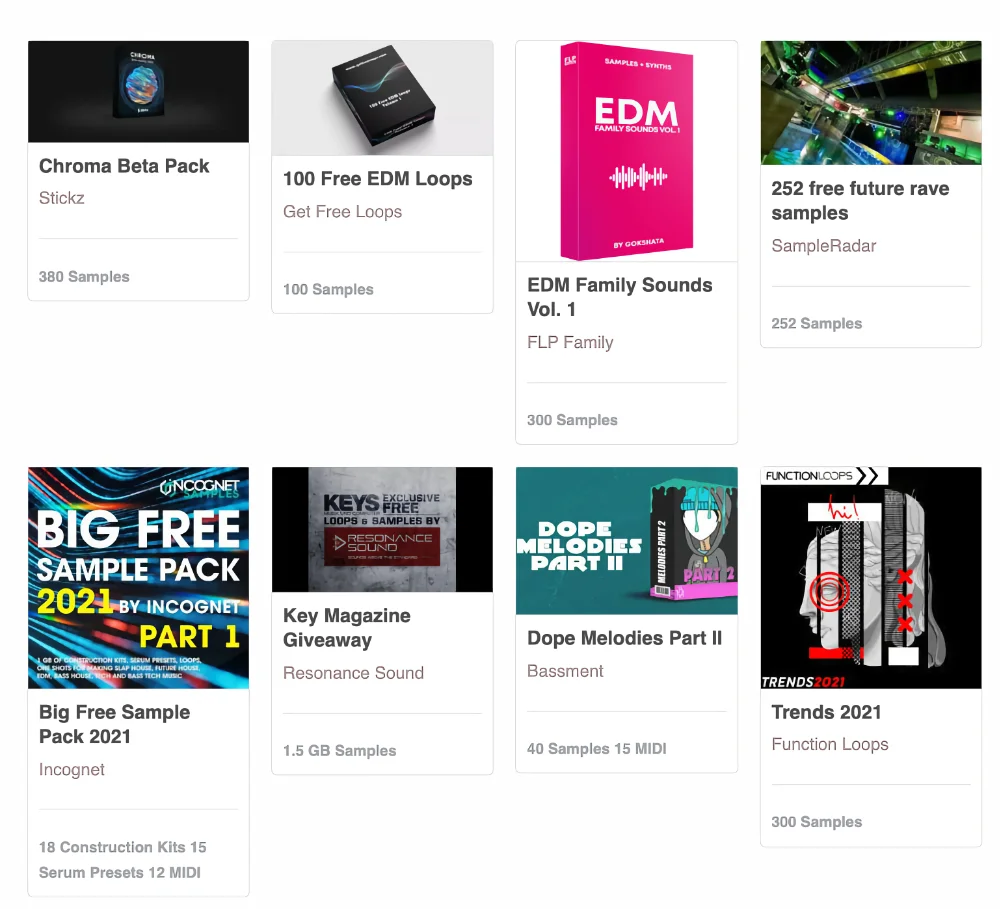
Why Use SoundShockAudio’s Library of Free Music Production Tools?
- over 3,000 freely available music tools
- each music tool is organized in an easy to navigate library
- many of the free tools rivals paid ones
- you’ll have everything you need to create professional music
Start your music production journey with SoundShockAudio and discover an expansive library of free tools perfect for beginner producers. Sign up today to access thousands of tools that make professional-sounding music attainable and affordable!
FAQ
What is sampling in music production?
Sampling in music production is the technique of taking a portion, or sample, of one sound recording and reusing it as an instrument or a sound recording in a different song or piece. Samples can consist of melodies, rhythms, speech, sounds, or entire bars of music and are typically used with the permission of the original creators.
What does it take to become a music producer?
To become a music and record producer, you need to develop a strong foundation in music theory and composition, learn to play instruments like the piano or drum kit, and understand the technical aspects of production, including mastering (audio) and using a mixing console.
What qualifications do I need to be a music producer?
Qualifications to be a music producer can range from having a bachelor’s degree in music to self-taught skills in music production software like Ableton. Creativity, understanding of acoustics, and proficiency in instruments or vocal arrangements are crucial.
How much does a producer make from a song?
A producer can make anywhere from $0 to $3,500 per song if they are new, with mid-level producers earning more. The amount varies based on factors like the contract, consent from artists, and the producer’s reputation. Building a solid social media presence can help you earn more as a producer. Also, consider becoming a DJ (disc jockey) as well as a music producer for diversified income.
How do I become a music producer from nothing?
To become a music producer from nothing, start by familiarizing yourself with music production software, learn music theory to understand melody, harmony, and rhythm, and practice regularly. Networking and collaborating with others in the industry can also help.
Is 30 too late to learn music production?
No, 30 is not too late to learn music production. Age does not limit one’s ability to learn new skills in music production, and many successful producers start at various stages of their lives.
Is it hard to become a music producer?
Becoming a music producer can be challenging due to the competitive nature of the music industry, the need for a broad skill set including technical and creative skills, and the importance of networking and building a reputation.
Can anyone become a music producer?
Yes, anyone with a passion for music and the dedication to learn the necessary skills can become a music producer. This includes understanding the technical aspects of production, developing musical skills, and continuously learning and adapting.
Is a music producer a good career?
A music producer can be a good career for those passionate about music and willing to put in the effort to learn and grow in the field. It offers creative satisfaction, the potential for financial success, and opportunities to work with artists across genres.
Start Your Music Production Journey Today!
The journey to becoming a music producer is both challenging and rewarding, encompassing a wide range of skills, knowledge, and experiences.
From understanding the intricate details of music theory and composition to mastering the technical aspects of sound engineering and digital audio workstations (DAW), the path requires dedication and a passion for music.
Building a music production studio, whether a modest home setup or a professional space, equips producers with the tools needed for music writing, recording, mixing, and mastering.
Networking and building a music producer network are crucial for finding opportunities and navigating the music production industry. Creating a strong portfolio and working with a variety of artists and music producer clients can help in establishing a reputation and securing more music producer jobs.
Key Steps
- Gain a solid foundation in music theory and sound engineering.
- Become proficient with a DAW and set up a personal music production studio.
- Build a strong portfolio and network within the music industry.
- Explore various career paths and continuously learn and adapt.
Aspiring music producers should approach their careers with dedication, hard work, and an openness to continuous learning. The music production industry is ever-evolving, and staying informed about new technologies, techniques, and trends is essential.
By embracing both the challenges and opportunities, aspiring producers can find their unique sound and make a significant impact on the world of music.

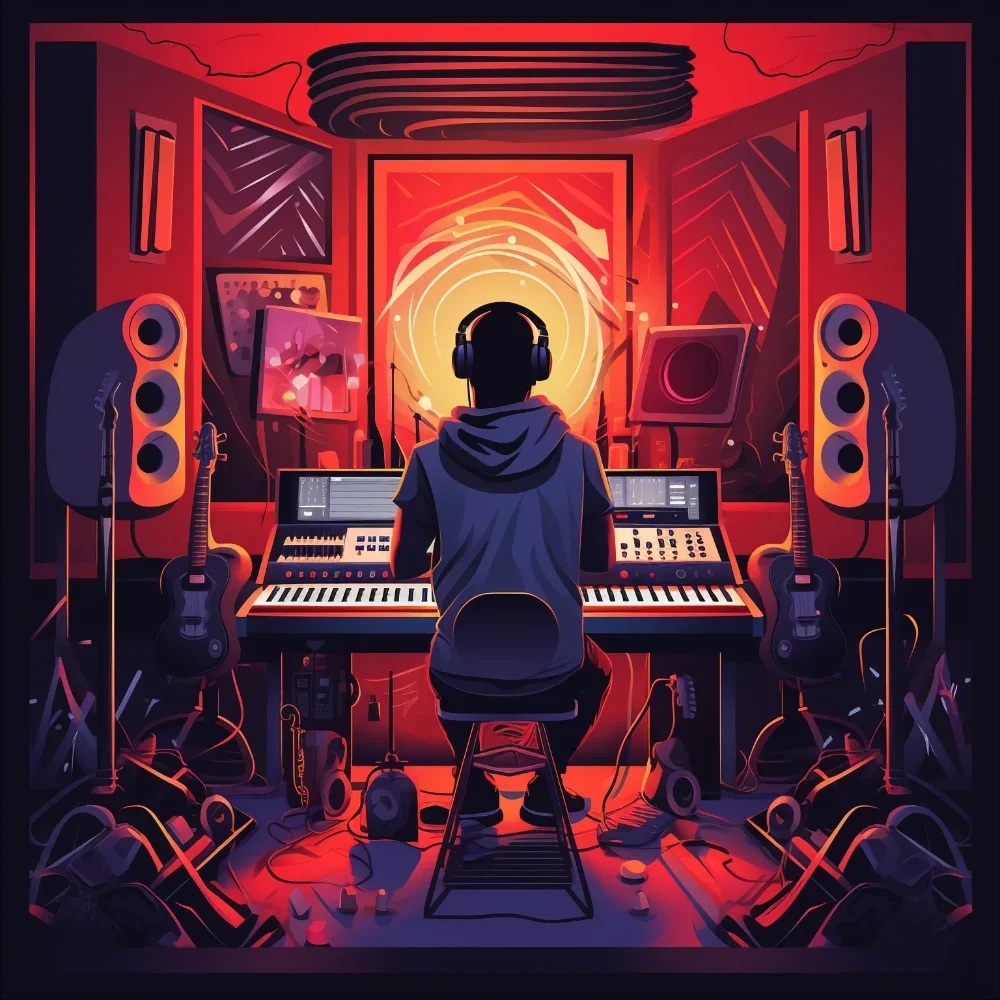




hey, so i was reading about the DAW stuff and got a bit lost, do I really need all those fancy software things to start? or can I just use something basic? thanks for the help, im kinda new to this.
You can definitely start with something basic! A lot of pros even use simpler setups. Focus on learning the basics and experimenting. Best of luck!
Setting up a production studio’s been a dream of mine, and this part of the article really hit home. It’s not about having the most expensive equipment but understanding your gear and making the most of it. Spot on advice, Daniel Strongin.
Is 30 too late to learn music production? Next you’ll tell me I’m too old to learn how to use the internet. Please, age is just a number, especially in music. Let’s not make it a retirement home yet!
I’ve been DJing for years and always wanted to get into production. This guide lays out a solid foundation for newbies like me. Education and training seem key, but hands-on experience is where it’s at. Curious if there are recommended paths for DJs moving into production.
There’s a lot of overlap between DJing and production. Many successful producers started as DJs. Focus on translating your understanding of music and rhythm into your productions. Good luck!